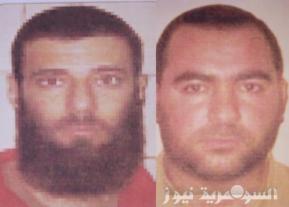|
|
|
Abu Bakr al Baghdadi al Husseini al Qurshi, the emir or leader of al Qaeda’s Islamic State of Iraq [right]; and Din Allah Abu Suleiman, the Islamic State of Iraq’s war minister [left]. Photos from Al Sumaria. |
The US government today has added the leader of al Qaeda’s affiliate in Iraq to the list of specially designated global terrorists and offered a $10 million reward for information leader to his capture.
Dr. Ibrahim ‘Awwad Ibrahim ‘Ali, also known as Abu Bakr al Baghdadi al Husseini al Qurshi and Abu Du’a, the emir or leader of the Islamic State of Iraq, al Qaeda’s front group, was added to the global terrorists list today by the State Department. The designation was made under Executive Order 13224, which allows the US to freeze his assets, prevent him from using financial institutions, and prosecute him for terrorist activities. The designation also prohibits American citizens from working with Abu Du’a.
Additionally, the $10 million bounty offered by the US through State’s Bureau of Diplomatic Security Rewards for Justice program makes Abu Du’a one of the top three most-wanted terrorists in the world. The other two are Ayman al Zawahiri, the head of al Qaeda, for whom the US has offered a $25 million reward; and Mullah Omar, the head of the Afghan Taliban, for whom a $10 million reward has been offered.
Abu Du’a became the head of al Qaeda in Iraq after Abu Omar al Baghdadi, his predecessor and the founder of al Qaeda’s Islamic State of Iraq, was killed by Iraqi and US troops in April 2010. Also killed in that same raid was Abu Ayyub al Masri, the Egyptian-born “War Minister” of al Qaeda in Iraq. Abu Du’a is an Iraqi from the central city of Samarra.
In addition to appointing Abu Du’a as emir, al Qaeda’s central command made two other appointments: Abu Abdullah al Husseini al Qurshi was named deputy for Abu Du’a (Abu Bakr), and Nasser al Din Allah Abu Suleiman was named the new War Minister. [See LWJ report, Al Qaeda appoints new ‘war minister’ for Iraq.]
Earlier this year, Abu Du’a issued a eulogy for slain al Qaeda leader Osama bin Laden, and “threatened violent retaliation” for his death, State reported. Al Qaeda in Iraq then proceeded to carry out multiple mass-casualty suicide attacks and terror assaults in Iraq.
The US government has linked Abu Du’a to numerous recent high-profile and deadly attacks in Iraq, including the Aug. 28, 2011 suicide strike at the Umm al-Qura mosque in Baghdad, which killed “prominent Sunni lawmaker Khalid al Fahdawi.” The target of the strike was Sheikh Ahmed Abdul Ghafour al Samarrai, the head of the influential Sunni Endowment, who has been critical of the terror group. [See LWJ report, Al Qaeda suicide bomber kills 28 Iraqis in attack in Baghdad mosque.]
Just 10 days prior to the Umm al-Qura mosque suicide attack, Abu Du’a announced the ‘Plan of the Good Harvest,’ which State described as a series of “varied attacks, including raids, suicide attacks, roadside bombs and small arms attacks in all cities and rural areas across Iraq.”
“We will begin this phase with an invasion that we called the invasion of ‘retaliation for Sheikh Osama bin Laden and the senior commanders, Abu Omar [al Baghdadi, the former leader of the ISI], Abu Hamza [al Muhajir, the war minister of the ISI and head of al Qaeda in Iraq], and Abu Ibrahim, the governor of Anbar,’ and it will start, with permission from Allah, in the middle of the month of fasting, and end … after exactly one-hundred raids,” according to the Aug. 19 statement, which was translated by the SITE Intelligence Group. “It will be diversified … between storming and martyrdom-seeking operations, in addition to devices, silencers, and snipers, in all the cities, villages and provinces.”
The designation of Abu Du’a comes just three months before the US prepares to withdraw its remaining combat troops, estimated at under 30,000, from Iraq. The US and Iraq are currently negotiating to allow a residual US force, estimated to be from 3,000 to 17,000 troops, to remain in Iraq after the beginning of 2012.
Iraqi security forces have taken the lead in security and counterinsurgency efforts against al Qaeda and allied terror groups, as well as against remaining Sunni and Shia insurgent groups. Al Qaeda in Iraq has suffered significant losses after the US switched to a robust counterinsurgency strategy in 2007 and with Iraqi troops tackled the terror groups in its safe havens. Today, although al Qaeda is able to conduct sporadic high-profile terror attacks, it no longer controls vast areas of Iraq.









3 Comments
What is he a ‘Dr’ of? Where was he educated?
I wonder how less frequent attacks will be if this guy is killed
Nasser al Din Allah Abu Suleiman , ISI’s War Minister, is the same “Abu Ibrahim, the governor of Anbar”, right?